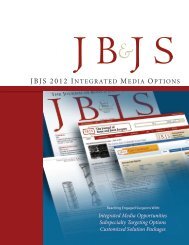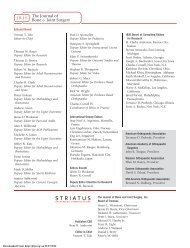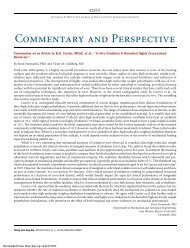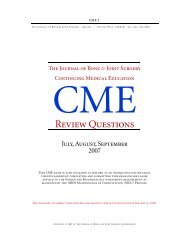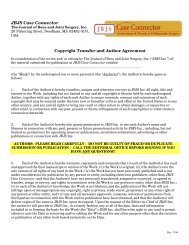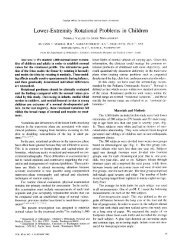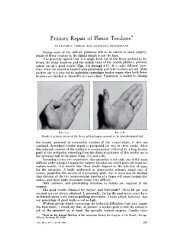Front Matter - The Journal of Bone & Joint Surgery
Front Matter - The Journal of Bone & Joint Surgery
Front Matter - The Journal of Bone & Joint Surgery
Create successful ePaper yourself
Turn your PDF publications into a flip-book with our unique Google optimized e-Paper software.
FRAGMIN<br />
(dalteparin sodium injection)<br />
For Subcutaneous Use Only<br />
BRIEF SUMMARY: For full prescribing information, see package insert.<br />
SPINAL/EPIDURAL HEMATOMAS<br />
When neuraxial anesthesia (epidural/spinal anesthesia) or spinal puncture is employed, patients anticoagulated or<br />
scheduled to be anticoagulated with low molecular weight heparins or heparinoids for prevention <strong>of</strong><br />
thromboembolic complications are at risk <strong>of</strong> developing an epidural or spinal hematoma which can result in<br />
long-term or permanent paralysis. <strong>The</strong> risk <strong>of</strong> these events is increased by the use <strong>of</strong> indwelling epidural catheters<br />
for administration <strong>of</strong> analgesia or by the concomitant use <strong>of</strong> drugs affecting hemostasis such as non steroidal<br />
anti-inflammatory drugs (NSAIDs), platelet inhibitors, or other anticoagulants. <strong>The</strong> risk also appears to be<br />
increased by traumatic or repeated epidural or spinal puncture. Patients should be frequently monitored for signs<br />
and symptoms <strong>of</strong> neurological impairment. If neurological compromise is noted, urgent treatment is necessary.<br />
<strong>The</strong> physician should consider the potential benefit versus risk before neuraxial intervention in patients<br />
anticoagulated or to be anticoagulated for thromboprophylaxis (also see WARNINGS, Hemorrhage and<br />
PRECAUTIONS, Drug Interactions).<br />
INDICATIONS AND USAGE<br />
FRAGMIN Injection is indicated for the prophylaxis <strong>of</strong> ischemic complications in unstable angina and non-Q-wave<br />
myocardial infarction, when concurrently administered with aspirin therapy (as described in CLINICAL TRIALS,<br />
Prophylaxis <strong>of</strong> Ischemic Complications in Unstable Angina and Non-Q-Wave Myocardial Infarction).<br />
FRAGMIN is also indicated for the prophylaxis <strong>of</strong> deep vein thrombosis (DVT), which may lead to pulmonary<br />
embolism (PE):<br />
• In patients undergoing hip replacement surgery;<br />
• In patients undergoing abdominal surgery who are at risk for thromboembolic complications;<br />
• In medical patients who are at risk for thromboembolic complications due to severely restricted mobility<br />
during acute illness.<br />
FRAGMIN is also indicated for the extended treatment <strong>of</strong> symptomatic venous thromboembolism (VTE) (proximal<br />
DVT and/or PE), to reduce the recurrence <strong>of</strong> VTE in patients with cancer.<br />
CONTRAINDICATIONS<br />
FRAGMIN Injection is contraindicated in patients with known hypersensitivity to the drug, active major bleeding, or<br />
thrombocytopenia associated with positive in vitro tests for antiplatelet antibody in the presence <strong>of</strong> FRAGMIN.<br />
Patients undergoing regional anesthesia should not receive FRAGMIN for unstable angina or non-Q-wave myocardial<br />
infarction, and patients with cancer undergoing regional anesthesia should not receive FRAGMIN for extended<br />
treatment <strong>of</strong> symptomatic VTE, due to an increased risk <strong>of</strong> bleeding associated with the dosage <strong>of</strong> FRAGMIN<br />
recommended for these indications. Patients with known hypersensitivity to heparin or pork products should not be<br />
treated with FRAGMIN.<br />
WARNINGS<br />
FRAGMIN Injection is not intended for intramuscular administration. FRAGMIN cannot be used interchangeably (unit<br />
for unit) with unfractionated heparin or other low molecular weight heparins. FRAGMIN should be used with<br />
extreme caution in patients with history <strong>of</strong> heparin-induced thrombocytopenia.<br />
Hemorrhage: FRAGMIN, like other anticoagulants, should be used with extreme caution in patients who have an<br />
increased risk <strong>of</strong> hemorrhage, such as those with severe uncontrolled hypertension, bacterial endocarditis,<br />
congenital or acquired bleeding disorders, active ulceration and angiodysplastic gastrointestinal disease,<br />
hemorrhagic stroke, or shortly after brain, spinal or ophthalmological surgery. Spinal or epidural hematomas can<br />
occur with the associated use <strong>of</strong> low molecular weight heparins or heparinoids and neuraxial (spinal/epidural)<br />
anesthesia or spinal puncture, which can result in long-term or permanent paralysis. <strong>The</strong> risk <strong>of</strong> these events<br />
is higher with the use <strong>of</strong> indwelling epidural catheters or concomitant use <strong>of</strong> additional drugs affecting<br />
hemostasis such as NSAIDs (see boxed WARNING and ADVERSE REACTIONS, Ongoing Safety Surveillance).<br />
As with other anticoagulants, bleeding can occur at any site during therapy with FRAGMIN. An unexpected drop in<br />
hematocrit or blood pressure should lead to a search for a bleeding site.<br />
Thrombocytopenia: In FRAGMIN clinical trials supporting non-cancer indications, platelet counts <strong>of</strong><br />



